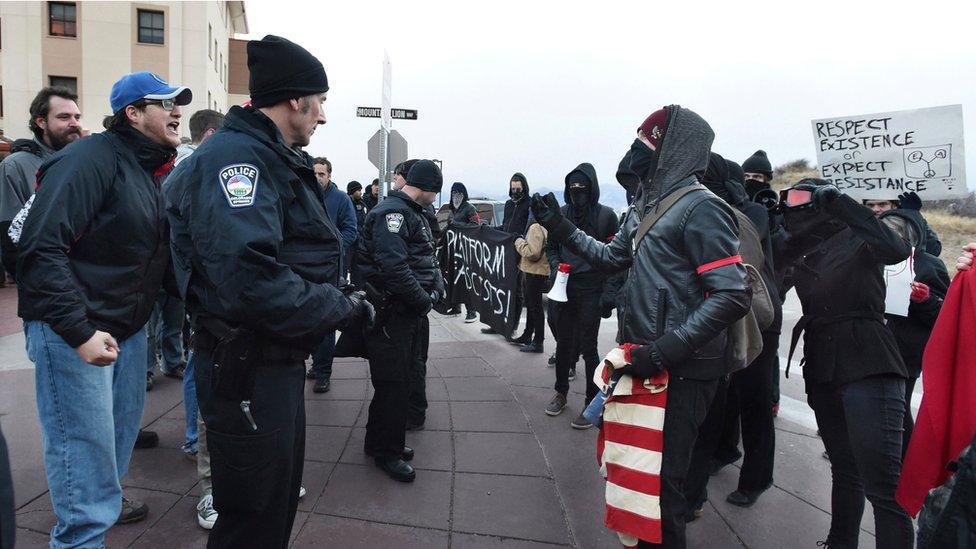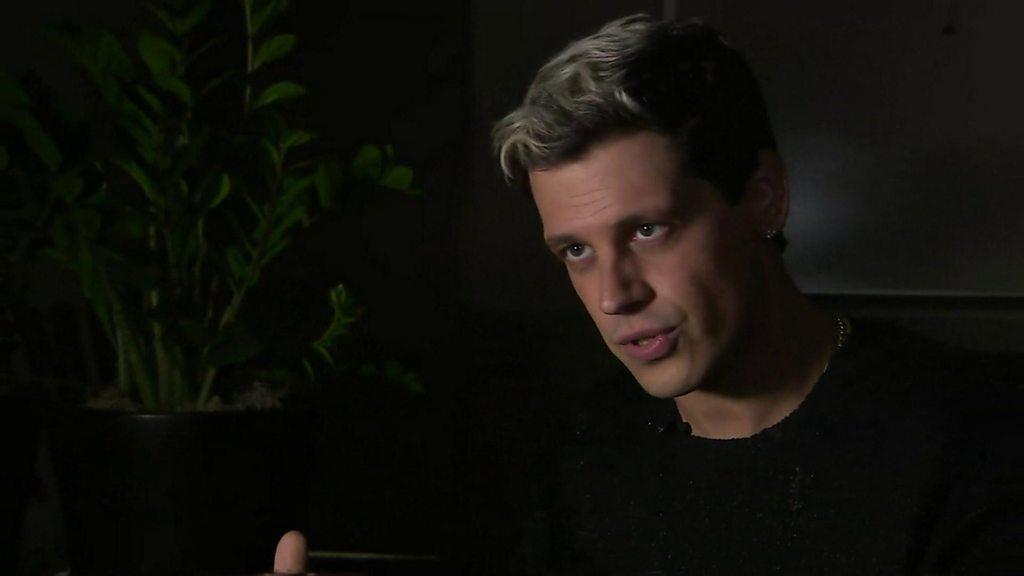Milo Yiannopoulos: Who is the alt-right writer and provocateur?
- Published

Writer Milo Yiannopoulos at one of his controversial university speaking engagements in the US
Ultra-conservative writer Milo Yiannopoulos has been uninvited from speaking at a US conservative conference, which will also host President Donald Trump, after footage emerged of him appearing to condone paedophilia.
Mr Yiannopoulos has denied the allegations, but is known to thrive on provoking offence and controversy.
Publisher Simon & Schuster has announced it is cancelling his forthcoming book, Dangerous, after the latest outcry.
The writer calls himself the "most fabulous supervillain on the internet". His critics call him a purveyor of hate speech.
'Alt-right is unstoppable,' says Milo Yiannopoulos
Mr Yiannopoulos blamed "sloppy editing" and "usual blend of British sarcasm, provocation and gallows humour" for creating the wrong impression of his views on paedophilia.
"I would like to restate my utter disgust at adults who sexually abuse minors," the 32-year-old wrote on Facebook.
However, the American Conservative Union (ACU), which organises the influential Conservative Political Action Conference (CPAC) in Maryland, said his response was "insufficient".
ACU chairman Matt Schlapp said the invitation to speak at the CPAC this week had been rescinded.
"We urge him to immediately further address these disturbing comments," he said., external
President Donald Trump is speaking at the event on Friday.
Who is Milo Yiannopoulos?
Milo Yiannopoulos is a British writer and editor, based in the US.
Born to a Greek father and British mother, he grew up in Kent in the south of England.
In July 2016, he was banned from Twitter for what the social media company referred to as "inciting or engaging in the targeted abuse or harassment of others".
It came after he took aim at Leslie Jones, a black actress in an all-female Ghostbusters reboot, and she received a barrage of abuse from other Twitter users.

Milo Yiannopoulos tweets about Ghostbusters actress Leslie Jones (far left) were blamed for encouraging a stream of racist abuse
He has also been widely criticised for comments he has made about transgender people, Muslims, Black Lives Matter activism, feminists and gay people, even though he is openly gay.
What else does he do?
He co-founded online technology magazine The Kernel in 2011 and sold it in 2014, after running up large debts and encountering legal battles with writers who sued for unpaid earnings.
In 2015, he was appointed as a senior editor at Breitbart News, a right-wing US website that has been criticised for racist and misogynist content.
Milo Yiannopoulos has written columns titled "Birth Control Makes Women Unattractive and Crazy" and "Would You Rather Your Child Had Feminism or Cancer?"

Colorado Springs police make a barrier between protesters against Milo Yiannopoulos, who are on the right, and those going to hear him speak at University of Colorado in January 2017
When presidential candidate Hillary Clinton read those headlines out disdainfully at one of her rallies last year, he considered it a win.
"Little did I realise when I coined the #FeminismIsCancer hashtag that it would end up in the mouth of the Democratic nominee for President," he wrote on Breitbart.com.

Read more:

This week, footage of a year-old podcast was unearthed, where Mr Yiannopoulos appears to condone paedophilia.
He said relationships between "younger boys" and older men could be a "coming-of-age relationship … in which those older men help those younger boys discover who they are".
Mr Yiannopoulos has denied the allegations on his Facebook page, blaming the way the clips were edited and his own "sloppy phrasing'' for any indication he supported paedophilia. "It is a vile and disgusting crime, perhaps the very worst," he said.
Trump is his 'daddy'
Breitbart News has close ties to the Trump administration. The site's chief executive, Steve Bannon, first headed Mr Trump's presidential campaign and was later appointed as his chief strategist in the White House.
Mr Yiannopoulos is an avid supporter of President Trump, whom he calls "daddy".

Former Breitbart News chief executive Steve Bannon (right) in a White House meeting with US President Donald Trump (left)
During the Republican National Convention in Cleveland, Ohio last July, Mr Yiannopoulos headlined an event called Gays for Trump.
President Trump criticised the University of Berkeley in California after it cancelled a talk by Mr Yiannopoulos, following violent student protests earlier this month.

A vandalised Bank of America office in Berkeley, Calfornia, after protests against Milo Yiannopoulos's university talk got out of hand
Mr Yiannopoulos's regular public speaking engagements often lead to protests on university campuses.
Where did he come from?
Mr Yiannopoulos went to Simon Langton Boys Grammar School in Canterbury, and dropped out of undergraduate courses at the University of Manchester and the University of Cambridge.
However, he came to prominence by playing a key role in an online troll war, known as Gamergate, which critics say is about misogyny in the video game world, but which supporters says is about ethics in games journalism.
He built up a following by being a "troll king", according to technology magazine Wired.
His YouTube channel now has more than 500,000 subscribers.
An alt-right mouthpiece?
Mr Yiannopoulos is regularly associated with the alt-right, a disparate nationalistic group, which is outspoken against so-called political correctness and feminism. It includes neo-Nazis, white supremacists and anti-Semites.
He says he does not consider himself part of the alt-right, although he has called it "energising and exciting".

Comedian Bill Maher (left) hosted Milo Yiannopoulos (right) on his television show
During an appearance on US television show Real Time on Friday, he joked about not being able to fit in as he is a "gay Jew who never shuts up about his black boyfriend".
Mr Yiannopoulos had a Jewish maternal grandmother.
On the same show, hosted by comedian Bill Maher, he equated feminism with a disease (again) and said transgender people was a disorder comparable to sociopathy.
'Dangerous'
His autobiography, Dangerous, had been due for publication next month.
When the book deal with publisher Simon & Schuster was announced in December 2016, it caused an outcry among his critics, who accused the company of promoting and funding hate speech.
On Monday, Simon and Schuster announced it was cancelling the publication of the book, after more than 100 of the publisher's other authors had protested against it.
Mr Yiannopoulos reportedly received a $250,000 (£200,000) advance for the book.
In protest at the deal, the Chicago Review of Books had already announced it would not review any Simon & Schuster books in 2017.
- Published2 February 2017

- Published8 November 2016

- Published20 February 2017

- Published26 August 2016

- Published7 November 2016

- Published23 November 2016

- Published21 February 2017
